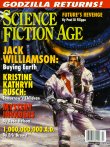Stories published July 1998
reviewed by Mark R. Kelly
 Interzone July 1998
Interzone July 1998
(issue profile)
Stephen Baxter, ''The Barrier''
In this Baxter story the astronauts are old geezers and they're on their way to Proxima II. They lose contact with Earth, having apparently passed through some barrier surrounding the solar system. Meanwhile the astronauts reflect on the social consequences back home of immortality, brought about by treatment of telomeres, the ends of chromosomes that control the number of times cell division takes place. The two themes are metaphorical; there's enough interesting material here for two or three good stories.
Jean-Claude Dunyach, ''Unravelling the Thead''
A curator at the Musem of Civilization reveals the secrets of a valuable 8th century Kurdish carpet: the way the changes in the patterns of tiny knots in the carpet's threads, or weft, reveal the life of its weaver. The fantastic is revealed in the simple magic of an ancient art.
Michael Iwoleit, ''Takeover''
A dense, technical description of the life of a future human entity, one of millions grown in a vast matrix with genetic codes for nanomachines and metallic exoskeletons. The entity is sent aboard a bioprobe on a mission to a primitive world, where it fulfills its evolutionary destiny. The story's message about the utility of intelligence is bleak, but itís well-informed about both the micro and macro aspects of evolution.
(Tue 15 Sep 98)
 Harvey Jacobs, ''Goobers'' (F&SF July 1998)
Harvey Jacobs, ''Goobers'' (F&SF July 1998)
Nestor Frick, faithful moviegoer (who plays a game with his favorite movie
candy), is frustrated by a big guy with obnoxious hair who blocks Nestor's view
of important new releases. It wrecks Nestor's social life and career; keeping up
with and being able to talk to people about movies is a crucial aspect of
contemporary life.
Richard Chwedyk, ''Auteur Theory'' (F&SF July 1998)
A retired film director gets a tape from a pirate video dealer of a film the
director wishes he had made but never did. Where did the tape come from and what
should he do with it? The mystery involves conventional SFnal devices, but the
interest is in musings about how films get made, how no two people seeing a
movie (or making it) perceive it quite the same way.
Paul Di Filippo, ''Plumage from Pegasus: Escapist Velocity''
(F&SF July 1998)
An essayist in 2159 bemoans filmmakers' neglect of relevant contemporary
material -- the interstellar battle between the Aldebaran and Ophiuchian
polities; the invasion of Webb IX by the Gaseous Horde -- in favor of escapist
nonsense like The Executioner's Song, The Kindness of Women, and
The Horse Whisperer. Di Filippo's wordplay is at times overly cute (film
directors Robert Kismetkiss, Ray Hairyhouse, and Ron Wardhow), but the essay's
upside down joke is delightful.
(Fri 10 Jul 98)
 Kage Baker, ''The Literary Agent'' (Asimov's July 1998)
Kage Baker, ''The Literary Agent'' (Asimov's July 1998)
A time traveler finds Robert Louis Stevenson ill on a hillside in 1879 and
offers him a deal to develop a treatment for the traveler's photoplay company.
The traveler's bosses in the future provide instant feedback on Stevenson's
ideas -- they want to change them! Baker perfectly captures the cheerfully
arrogant hypocrisy of Hollywood agents and producers.
R. Garcia y Robertson, ''Starfall'' (Asimov's July 1998)
Widescreen space adventure with an offhand intelligence surpassing anything put
out by Hollywood. In a star system about to be torn apart by the tidal effects
of a passing giant white star, a traveler named Tiffany Panic gains passage to a
remote habitat called Floreal. She and her pilot are hijacked by space pirates,
battle Bugs and SuperChimps, and negotiate with the curious society of Floreal,
where men's and women's affairs are totally separate. One shudders to speculate
which parts of the story would disappear in the film version; the lesbianism for
sure!
Ian R. MacLeod, ''Nevermore'' (Asimov's July 1998)
An introspective story about a painter in a future when virtual reality is so
sophisticated and pervasive that it's just called 'reality'. Gustav's wife has
died and become, via recording, a 'ghost' in VR reality, able to resume their
relationship, if he wants it. MacLeod's subtle, passionate story parallels
Robert Silverberg's canonical ''Born with the Dead'' from 1974, with the
contemporary VR twist that offers new insights into the meaning and purpose of
art.
Leslie What, ''Say Woof'' (Asimov's July 1998)
Olivia takes a job as a temporary pet, wearing a body-suit to play dog for a
wealthy old lady in a luxury condo. She's content, for a while. A charming,
offbeat tale suggests why people need people, or pets.
(Fri 10 Jul 98)
 Kristine Kathryn Rusch, ''Coolhunting'' (SF Age July 1998)
Kristine Kathryn Rusch, ''Coolhunting'' (SF Age July 1998)
Steffie is a 'coolhunter', spotting innovations in fashion or behavior, covertly
videotaping them, and selling the tapes to clients able to exploit new ideas as
trends. Her life is disrupted by news that her sister KD is dying -- KD, victim
of a trend from several decades before, medically arrested at a child's physical
age. The complexity of themes, emotional and sociological, make this one of
Rusch's most rewarding stories in years.
Paul Di Filippo, ''Jack Neck and the Worrybird'' (SF Age July
1998)
A story inspired by the garish art of Chris Mars, who in turn illustrates it.
Jack Neck is a retiree assaulted by a huge bird that attaches itself to his
shoulder and utters ''Never again, but not yet!''. Readable as a parable about
future society's inability to solve human ills, the story's principal effect is
its language, which outdoes Di Filippo's typical wordplay: Ribofunk spiced with
Lewis Carroll, Anthony Burgess, and Edgar Allen Poe.
(Fri 10 Jul 98)


 Interzone July 1998
Interzone July 1998 Harvey Jacobs, ''Goobers'' (F&SF July 1998)
Harvey Jacobs, ''Goobers'' (F&SF July 1998) Kage Baker, ''The Literary Agent'' (Asimov's July 1998)
Kage Baker, ''The Literary Agent'' (Asimov's July 1998) Kristine Kathryn Rusch, ''Coolhunting'' (SF Age July 1998)
Kristine Kathryn Rusch, ''Coolhunting'' (SF Age July 1998)